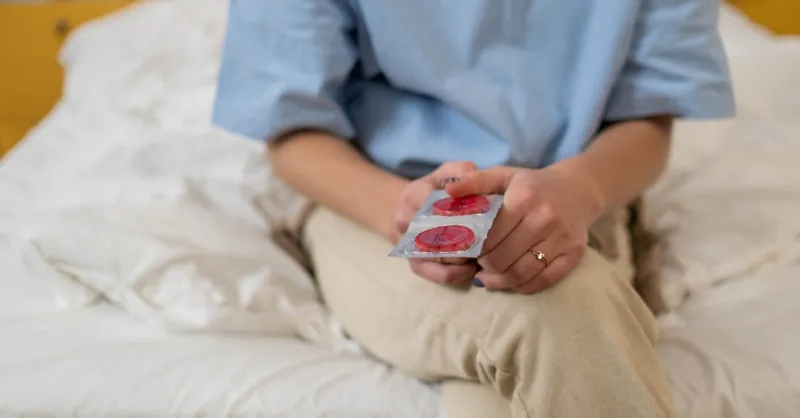Top Tips for First-Time Sexual Experiences
Category: Romance & Relationships
Navigating Your First Sexual Experience with Confidence
Embarking on your first sexual experience can be as exciting as it is nerve-wracking. Whether you're a single person exploring intimacy or a couple deepening your connection, this moment is often filled with anticipation, questions, and a desire for clarity. You might be wondering how to create a safe, pleasurable, and meaningful encounter that respects your boundaries and emotions. Maybe you've scoured forums and other blogs but found advice scattered or vague, leaving you unsure where to start.
This guide is crafted just for you: individuals craving clear, insightful guidance that cuts through the noise. Here, you'll find practical tips to prepare emotionally and physically, communication strategies that foster trust, and essential knowledge to navigate consent, comfort, and pleasure. Our approach is grounded in respect and empowerment, helping you feel confident and informed as you take this important step. So if you’re ready to enhance your understanding and set the stage for a positive first-time sexual experience, read on—we’ll cover everything from setting expectations to aftercare, ensuring you feel supported throughout your journey.
- Navigating Your First Sexual Experience with Confidence
- Understanding Your Readiness: Assessing Emotional and Physical Readiness and Knowing Your Personal Boundaries
- The Importance of Consent: Clear Communication and Mutual Respect
- Effective Communication Techniques: How to Discuss Desires, Fears, and Boundaries Honestly with a Partner
- Setting the Scene: Creating a Safe and Comfortable Environment to Reduce Anxiety and Enhance Intimacy
- Preparation Essentials: Hygiene, Contraception, and Sexual Health Basics
- Managing Expectations: Addressing Common Myths and Reducing Performance Anxiety
- Exploring Pleasure and Sensuality: Embracing a Pressure-Free Approach to Intimacy
- Dealing with Emotions Post-Experience: Navigating Emotional Responses and Seeking Support
- Troubleshooting Common Concerns: Solutions and Advice for Discomfort, Anxiety, and Lubrication
- Building a Positive Sexual Relationship: Nurturing Connection, Ongoing Communication, and Growth
Understanding Your Readiness: Assessing Emotional and Physical Readiness and Knowing Your Personal Boundaries
Before engaging in your first sexual experience, it’s crucial to take a moment for self-assessment—both emotionally and physically. Emotional readiness means feeling secure, confident, and free from external pressures or fears. Ask yourself whether you truly want to take this step for your own reasons, rather than to please someone else or because you feel obligated. Recognizing feelings like nervousness or excitement can be normal, but persistent anxiety or uncertainty might signal that more time is needed. Being emotionally prepared also involves understanding your expectations and having clear personal boundaries.
Physical readiness involves feeling comfortable and healthy in your body, as well as having basic knowledge about safe sex practices, contraception, and sexually transmitted infection (STI) prevention. This foundation helps you take control of your sexual health and enhances your confidence. To clarify your boundaries, consider the following:
- What are your non-negotiables? Identify acts or situations you’re not comfortable with.
- What are you curious to explore? Knowing what you might want to try can make communication with your partner easier.
- How will you express ‘no’ or a need to pause? Planning for honest and assertive communication fosters mutual respect.
- Have you thought about consent thoroughly? Understanding that consent is an ongoing, enthusiastic agreement—always reversible, at any point—is key.
Taking the time to check in with yourself and your partner about these aspects lays a solid foundation for a first sexual experience that respects your emotional well-being, physical safety, and personal boundaries. This awareness empowers you to approach intimacy on your terms, ensuring that your journey into sexual connection is both fulfilling and confidently safe.

Image courtesy of MART PRODUCTION
The Importance of Consent: Clear Communication and Mutual Respect
Consent is the cornerstone of any positive and fulfilling sexual experience, especially for first-timers. It’s not just a one-time checkmark but an ongoing, enthusiastic agreement that both partners give freely and can withdraw at any moment. Understanding how to give, receive, and respect consent ensures that both you and your partner feel safe, valued, and empowered throughout your encounter.
How to Give and Receive Consent Effectively
Open, honest communication is key when navigating consent. Here’s how to approach it:
- Use Clear, Direct Language: Avoid ambiguous phrases. Instead of hoping your partner “gets the hint,” say what you want or don’t want aloud—such as “I’m comfortable with this,” or “Let’s slow down.”
- Ask Questions and Listen: Checking in with your partner regularly (“Is this okay?”, “Do you want to keep going?”) shows respect and attentiveness. Listen actively to their responses—verbal and nonverbal.
- Respect Boundaries Without Pressure: If your partner says no or hesitates, honor their feelings without attempting to persuade or guilt them. Consent must always be voluntary.
- Be Mindful of Nonverbal Cues: While verbal consent is ideal, sometimes body language provides important feedback. If your partner seems uncomfortable or withdrawn, pause and check in.
- Remember Consent is Ongoing: Just because consent was given at the start doesn’t mean it applies indefinitely. Feel empowered to pause or stop at any point, and encourage your partner to do the same.
Creating a Safe Space for Consent
To foster a culture of consent that enhances trust and intimacy, consider these practices:
- Set the Tone Early: Discuss boundaries, desires, and any concerns before physical intimacy begins. Having this conversation ahead of time can relieve anxiety.
- Normalize Consent Talk: Treat honest communication about consent and boundaries as a natural and essential part of your relationship or encounter.
- Use “Yes Means Yes” Mindset: Focus on enthusiastic participation rather than the absence of refusal.
- Be Patient: Consent conversations might feel awkward at first, but with practice, they become easier and deepen your connection.
By prioritizing clear consent and open dialogue, you create a mutually respectful environment where both partners feel safe to express themselves authentically. This not only protects physical and emotional safety but enriches the overall experience, building a foundation for healthy, enjoyable sexual relationships now and in the future.

Image courtesy of Gustavo Fring
Effective Communication Techniques: How to Discuss Desires, Fears, and Boundaries Honestly with a Partner
Open and honest communication is the foundation of any healthy sexual relationship, especially when navigating your first intimate encounter. Discussing your desires, fears, and boundaries with a partner not only builds trust and mutual respect but also ensures that both of you feel comfortable and understood throughout the experience. Without clear dialogue, misunderstandings and discomfort can arise, potentially undermining the pleasure and connection you hope to create.
How to Start the Conversation
Initiating a candid conversation about sex can feel intimidating, but framing it as an opportunity for connection makes it easier. Here are some tips to communicate effectively:
- Choose the Right Time and Place: Pick a private, relaxed setting free of distractions, so both of you can focus fully on the conversation.
- Use “I” Statements: Express your thoughts and feelings from your own perspective, such as “I feel nervous about trying this for the first time,” or “I really enjoy when…” This approach reduces potential defensiveness.
- Be Specific About Desires and Boundaries: Clearly state what you are curious to explore and what you want to avoid. For example, “I’d like to try [specific activity], but I’m not comfortable with [another activity].”
- Share Your Fears and Concerns: Being vulnerable about anxieties, like worries about performance or emotional impact, invites empathy and reassurance.
- Invite Your Partner’s Input: Encourage them to share their feelings and boundaries too, making the conversation a two-way street.
- Practice Active Listening: Show you value your partner’s perspective by paraphrasing what they say and asking clarifying questions if needed.
The Benefits of Honest Communication Before Sex
When you openly communicate with your partner beforehand, you create a safe and supportive environment that enhances emotional intimacy and sexual satisfaction. Clear discussions help:
- Reduce anxiety and uncertainty by aligning expectations.
- Prevent accidental boundary crossings that can harm trust.
- Increase pleasure through shared knowledge of what each partner enjoys or dislikes.
- Strengthen your connection by fostering empathy and respect.
- Empower both partners to voice their needs freely, promoting ongoing, enthusiastic consent.
Remember, effective communication isn’t a one-time event but an ongoing practice. By making honest dialogue about desires, fears, and boundaries a regular part of your relationship or casual encounters, you pave the way for more confident, comfortable, and fulfilling sexual experiences. This proactive approach will not only benefit your first time but also deepen intimacy throughout your journey of connection and pleasure.

Image courtesy of August de Richelieu
Setting the Scene: Creating a Safe and Comfortable Environment to Reduce Anxiety and Enhance Intimacy
Establishing the right environment is essential for a positive first sexual experience. A safe and comfortable setting not only helps reduce anxiety but also nurtures intimacy and trust between partners. When you feel physically and emotionally at ease, it's easier to focus on connection and pleasure rather than distractions or worries.
Tips for Creating the Ideal Atmosphere
- Choose a Private, Relaxed Space: Privacy is crucial to feeling secure. Whether it’s a cozy bedroom, a quiet living room, or another intimate space, make sure it’s free from interruptions or potential stressors.
- Set a Soothing Ambiance: Soft lighting, such as candles or dim lamps, helps relax the mind and body. Pleasant, calming scents like lavender or vanilla can further ease tension.
- Minimize Distractions: Turn off or silence phones, close doors, and reduce noise to create an environment focused solely on you and your partner.
- Comfort Matters: Have comfortable seating or bedding available. Fresh linens, pillows, and blankets can add a sense of coziness and warmth.
- Prepare Together: Engaging in small rituals, like choosing music or setting up the room, can build anticipation while promoting teamwork and mutual care.
- Allow Time Without Rushing: Rushing increases stress and can detract from enjoyment. Ensure you both have ample time to relax, connect, and explore at your own pace.
- Have Necessary Supplies Handy: Keep safe sex products like condoms and lubricant accessible to avoid interrupting the mood later and maintain a sense of security.
By intentionally designing a calm, comfortable physical space, you create an environment where vulnerability feels supported, anxiety diminishes, and intimacy flourishes. This thoughtful preparation empowers you and your partner to focus fully on each other, making your first sexual experience both emotionally safe and pleasurable.

Image courtesy of iddea photo
Preparation Essentials: Hygiene, Contraception, and Sexual Health Basics
Preparing thoughtfully for your first sexual experience is a crucial step toward feeling confident, comfortable, and safe. Good personal hygiene, effective contraception, and understanding your sexual health form the foundation of a responsible and enjoyable encounter. These preparation essentials not only protect your physical wellbeing but also demonstrate respect for yourself and your partner.
Prioritizing Hygiene for Comfort and Confidence
Maintaining cleanliness before and after sexual activity helps prevent infections and enhances overall comfort, reducing anxiety about the experience. Key hygiene practices include:
- Showering or bathing beforehand: This refreshes you and helps you feel physically prepared.
- Washing hands thoroughly: Especially important if you or your partner will be touching sensitive areas.
- Caring for genital hygiene: Gentle washing with mild, fragrance-free soap and water is sufficient; avoid harsh scrubs or douching, which can disrupt natural balance.
- Using clean towels and bedding: Fresh linens reduce the risk of infections and create a pleasant environment.
- Urinate after sex: This simple practice helps flush bacteria from the urinary tract, lowering the chance of urinary tract infections (UTIs).
Choosing the Right Contraception Method
Understanding and deciding on contraception beforehand empowers you to take control of your reproductive health. Here are some effective contraception options to consider for your first sexual experience and beyond:
- Condoms: Widely accessible and the only method that protects against most sexually transmitted infections (STIs) while preventing pregnancy.
- Hormonal methods: Including birth control pills, patches, rings, injections, or implants, which regulate ovulation and provide high pregnancy prevention but do not protect against STIs.
- Intrauterine devices (IUDs): Long-term, reversible options inserted by a healthcare provider, effective for several years.
- Emergency contraception: A backup plan in case of contraception failure or unprotected sex—available as pills or copper IUDs.
- Natural family planning: Tracking fertility signals, although less reliable and requiring thorough understanding.
Discuss contraception openly with your partner and, if possible, consult a healthcare professional to choose the best method for your lifestyle and needs.
Understanding Sexual Health: Knowledge is Empowerment
Familiarity with basic sexual health concepts helps you prepare for a pleasurable and safe encounter:
- Know the common STIs: Including chlamydia, gonorrhea, herpes, HPV, and HIV, their symptoms, and testing procedures.
- Get tested: Prior to becoming sexually active, consider STI screening for peace of mind and safety.
- Learn about signs of infection: Early detection allows prompt treatment, reducing complications.
- Use protection consistently: Practicing safe sex is the most effective way to prevent STIs and unintended pregnancy.
- Communicate with your partner: Sharing sexual health status builds trust and reduces risks.
By prioritizing hygiene, contraception, and sexual health awareness, you set yourself up for a first sexual experience marked by safety, respect, and confidence. These preparation essentials empower you to focus on connection and pleasure, knowing that you’re taking proactive steps to care for your body and emotional wellbeing.

Image courtesy of cottonbro studio
Managing Expectations: Addressing Common Myths and Reducing Performance Anxiety
Entering your first sexual experience often comes with a mix of excitement and pressure fueled by widespread myths and unrealistic expectations. These misconceptions can lead to undue performance anxiety, disappointment, and stress, detracting from the enjoyment and intimacy of the moment. Managing your expectations realistically is therefore essential to fostering a positive, fulfilling sexual encounter.
Common Myths to Challenge
- "Sex should be perfect and effortless." The reality is that first-time sexual experiences often involve learning curves, awkward moments, and adjustments. Mistakes or nervousness are normal and part of building comfort and connection.
- "Everyone is constantly ‘in the mood’ and knows exactly what to do." Desire fluctuates, and sexual knowledge grows with experience. Expecting instant chemistry or flawless technique can create unnecessary pressure.
- "Performance defines your worth or attractiveness." Pleasure and connection are not solely about physical performance or endurance. Emotional connection, communication, and mutual respect matter far more.
- "Things should look like they do in pornography." Pornography is scripted and often unrealistic, emphasizing visual spectacle over authentic intimacy or consent. Real sex is diverse, messy, and unique to each couple.
- "If it doesn’t happen on the first try, something is wrong." It’s common for physical and emotional comfort to develop gradually. Patience and openness to learning set the stage for future enjoyable experiences.
How to Reduce Performance Pressure and Anxiety
- Focus on Connection, Not Perfection: Shift your mindset toward sharing closeness and exploring intimacy rather than achieving a “perfect” outcome.
- Practice Mindfulness and Self-Compassion: Accept your feelings without judgment and remind yourself that nerves are natural. Taking deep breaths can ease tension.
- Communicate Openly with Your Partner: Sharing any anxieties or expectations reduces misunderstandings and helps create a supportive atmosphere.
- Set Realistic Goals: Prioritize trust, consent, and comfort over specific acts or timelines. Each experience is a step toward understanding your and your partner’s desires.
- Allow Playfulness and Humor: Lightening the mood with laughter can relieve pressure and strengthen your bond.
By confronting myths head-on and adopting a compassionate, grounded perspective, you empower yourself to enjoy your first sexual experience with confidence, authenticity, and reduced anxiety. Remember that sexuality is a personal journey—embrace it with patience and kindness for yourself and your partner.

Image courtesy of Ketut Subiyanto
Exploring Pleasure and Sensuality: Embracing a Pressure-Free Approach to Intimacy
Focusing on pleasure and sensuality during your first sexual experience transforms the encounter from a performance-based event into a joyful exploration of connection and self-discovery. Instead of rushing toward a specific goal or outcome, centering your attention on what feels good—both physically and emotionally—cultivates a relaxed and fulfilling atmosphere where intimacy can naturally deepen.
How to Tune Into Pleasure and Sensuality
- Slow Down and Be Present: Mindful awareness allows you to savor touch, scent, sounds, and emotional cues. Feeling fully present with your body and your partner opens pathways to authentic pleasure.
- Explore Sensations Gently: Experiment with different forms of touch—soft caresses, gentle kisses, or playful massages—to discover what elicits positive responses. There’s no “right” or “wrong” way; curiosity without judgment is key.
- Communicate Preferences in Real-Time: Share what feels pleasurable and invite your partner to do the same. Using simple phrases like “That feels nice” or “Can you try this?” fosters an ongoing exchange that enhances enjoyment.
- Embrace Non-Sexual Intimacy: Sensuality extends beyond genital-focused activity. Activities such as cuddling, eye contact, and synchronized breathing build emotional closeness that enriches physical pleasure.
- Let Go of Performance Pressure: Removing expectations about what should happen creates space for experimentation and mutual enjoyment. Focus on connection instead of “doing it right.”
Why a Pressure-Free Mindset Enhances Your Sexual Experience
Approaching intimacy without pressure encourages both partners to relax, be honest, and explore without fear of judgment or disappointment. This freedom nurtures deeper trust and can lead to discovering new sources of pleasure and emotional fulfillment. Especially for first-timers, adopting a non-goal-oriented approach helps reduce anxiety, support boundaries, and create positive associations with sexual experiences that build confidence for the future.
By prioritizing sensation, open communication, and emotional safety over scripted expectations, you transform your first sexual encounter into a meaningful journey of satisfaction and self-awareness. This attitude not only enriches immediate pleasure but also lays a strong foundation for healthy, joyful intimacy throughout your romantic and sexual life.

Image courtesy of cottonbro studio
Dealing with Emotions Post-Experience: Navigating Emotional Responses and Seeking Support
After your first sexual experience, it’s completely natural to encounter a range of emotions—from joy and excitement to confusion, vulnerability, or even disappointment. Understanding that your emotional responses are valid and varied helps you process this significant event healthily and compassionately. Sometimes, feelings may be immediate, while other times they can surface days or weeks later as you reflect on the encounter and your connection with your partner.
Common Emotional Responses After Your First Sexual Experience
- Positive Feelings: Happiness, closeness, increased confidence, relief, and satisfaction often accompany a consensual and pleasurable experience.
- Mixed Emotions: It’s normal to feel both happy and unsure, or excited yet nervous, as you integrate new feelings about intimacy and vulnerability.
- Unexpected Reactions: You might experience sadness, anxiety, guilt, or regret, especially if the experience didn’t meet your expectations or if external pressures influenced your decision.
- Emotional Vulnerability: Intimacy can trigger deep feelings related to self-esteem, trust, or past experiences, leading to heightened sensitivity.
How to Support Yourself Emotionally Post-Experience
- Allow Yourself to Feel: Resist the urge to suppress or judge your emotions. Acknowledge whatever arises with kindness and curiosity.
- Reflect Constructively: Journaling or talking through your experience with trusted friends or loved ones can help make sense of your feelings.
- Practice Self-Compassion: Remind yourself that first sexual encounters are learning experiences without “right” or “wrong” outcomes.
- Maintain Open Communication: If you have an ongoing relationship with your partner, share your feelings and check in with them to foster mutual understanding.
- Engage in Self-Care: Activities like rest, nutritious food, gentle physical movement, or mindfulness meditation support emotional balance.
When and How to Seek External Support
If challenging emotions persist, interfere with your daily life, or stem from distressing experiences such as coercion or lack of consent, it’s important to seek professional guidance. Consider these options:
- Therapists or Counselors: Professionals trained in sexual health, trauma, or relationship issues can provide a safe, confidential space to explore your feelings and develop coping strategies.
- Support Groups: Connecting with others who have similar experiences normalizes your emotions and mitigates feelings of isolation.
- Medical Professionals: For emotional distress linked to physical health concerns, consult healthcare providers who can address both mind and body wellness.
Recognizing the need for support is a sign of strength and self-respect. Prioritizing your emotional health after your first sexual experience not only aids healing but also empowers you to cultivate fulfilling, affirming intimacy in the future. By embracing your feelings with honesty and care, you build resilience and confidence that enrich your ongoing journey of romance, pleasure, and connection.

Image courtesy of Alex Green
Troubleshooting Common Concerns: Solutions and Advice for Discomfort, Anxiety, and Lubrication
It’s completely normal to encounter some challenges during your first sexual experience, such as physical discomfort, anxiety, or issues with lubrication. Recognizing these common concerns and knowing how to address them proactively can help you remain calm and focused on connection and pleasure rather than frustration or worry.
Managing Physical Discomfort and Pain
Discomfort can arise for various reasons, including tension, inadequate arousal, or unfamiliar sensations. To minimize pain or unease:
- Prioritize Foreplay and Arousal: Taking time for extended foreplay helps your body relax and naturally increases lubrication, which reduces friction and discomfort.
- Use Quality Lubricant: Even natural lubrication may not be sufficient the first time. A water-based or silicone-based lubricant can significantly improve comfort and ease penetration.
- Communicate Openly: Let your partner know if something feels uncomfortable or painful so you can adjust pace, position, or technique together.
- Go Slow and Breathe Deeply: Slowing down and employing deep, steady breaths relax your pelvic muscles, lessening tension and pain.
- Try Different Positions: Some positions provide better control and comfort; experiment to find what feels best for you.
If pain persists despite these measures, it’s wise to consult a healthcare provider to rule out underlying issues such as infections or conditions like vaginismus.
Overcoming Anxiety and Nervousness
Feeling nervous before or during your first sexual encounter is common and can affect your ability to relax and enjoy intimacy. To ease anxiety:
- Practice Mindfulness and Relaxation Techniques: Deep breathing, progressive muscle relaxation, or grounding exercises help calm your nervous system.
- Focus on Connection Rather Than Performance: Remind yourself the goal is mutual pleasure and emotional closeness, not perfection or speed.
- Create a Supportive Environment: Choose a familiar, safe setting and ensure you have time without rushed expectations.
- Share Your Feelings With Your Partner: Honest communication about your nerves builds empathy, reduces pressure, and fosters trust.
- Set Realistic Expectations: Acknowledge that first-time experiences often involve learning and adjustment, not flawless execution.
If anxiety significantly interferes with intimacy or causes distress, consider speaking with a therapist specializing in sexual health or anxiety management for tailored support.
Addressing Lubrication Challenges Effectively
Insufficient lubrication is a frequent issue but easily addressed with understanding and preparation:
- Use Personal Lubricants: Choose from water-based (safe for all toys and condoms) or silicone-based (long-lasting and silky) lubricants to enhance moisture and reduce friction.
- Avoid Irritants: Steer clear of scented or flavored lubricants that can irritate sensitive skin.
- Stay Hydrated and Well-Rested: Overall health impacts natural lubrication, so maintaining hydration and rest supports your body’s responses.
- Engage in Adequate Stimulation: Mental and physical arousal stimulates natural lubrication; incorporate kissing, caressing, and other erogenous zone exploration.
- Consider Hormonal Factors: If dryness persists, particularly for those using hormonal contraception or experiencing hormonal changes, consult a healthcare provider about solutions.
By proactively troubleshooting these common first-time sexual challenges with clear, practical strategies, you empower yourself to navigate intimacy with greater ease, confidence, and enjoyment. Addressing physical comfort, emotional ease, and lubrication needs paves the way for a positive and fulfilling sexual experience that honors your boundaries and pleasure.

Image courtesy of Piotr Arnoldes
Building a Positive Sexual Relationship: Nurturing Connection, Ongoing Communication, and Growth
Your first sexual experience marks the beginning of a journey—not just a single event. Building a positive sexual relationship with your partner involves nurturing emotional connection, fostering ongoing communication, and embracing mutual growth beyond that initial encounter. A strong foundation based on trust, respect, and openness ensures that intimacy deepens naturally, making future experiences more fulfilling and rewarding.
Cultivating Lasting Connection and Trust
- Prioritize Emotional Intimacy: Sexual connection thrives when emotional closeness is nurtured. Spend quality time together outside the bedroom, sharing thoughts, dreams, and vulnerabilities to build trust.
- Practice Regular Check-Ins: Make a habit of discussing how you each feel about your sexual relationship—your likes, dislikes, boundaries, and any evolving desires. This ongoing dialogue reinforces safety and helps prevent misunderstandings.
- Show Appreciation and Affirmation: Express gratitude and affection genuinely. Positive reinforcement encourages openness and signals that both partners value each other holistically, beyond just physical intimacy.
Embracing Growth Through Transparent Communication
- Be Open to Feedback: As you learn what brings pleasure and what doesn’t, invite constructive feedback and be willing to adjust. This mindset transforms sexual experiences into shared exploration rather than performance.
- Discuss Changes and Challenges: Life circumstances, stress, health, or relationship dynamics can impact sexual desire or comfort. Addressing these changes honestly keeps your connection resilient.
- Create Space for Experimentation: Healthy sexual relationships evolve through curiosity and mutual consent. Trying new activities or deepening existing ones together fosters excitement and prevents stagnation.
By committing to clear, compassionate communication and a mindset of continuous learning, you nurture a sexual relationship that honors both partners’ needs and boundaries. This approach not only enhances pleasure and intimacy but also fosters a deep, lasting bond—a vital aspect of happiness and fulfillment in dating, romance, and sex for singles and couples alike.

Image courtesy of Kampus Production
